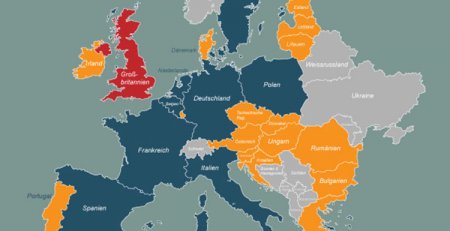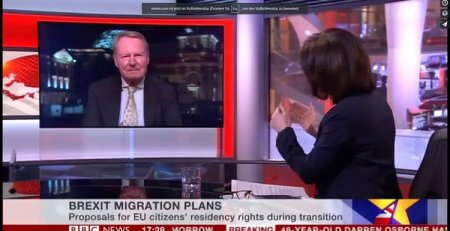Brexit Modellvergleich, englische Version
Brexit Model Comparison
 No DEAL |  New Deal for Britain and the EU |  The Norway model |  The Switzerland model The Switzerland model |  The Turkey / Ukraine model The Turkey / Ukraine model |  Singapore and Hong Kong approach Singapore and Hong Kong approach |  IPPR's shared market IPPR's shared market |  The Canada option |
|
|---|---|---|---|---|---|---|---|---|
| Hard Brexit | No Brexit | Soft Brexit | Soft Brexit | Soft Brexit | Soft Brexit | Soft Brexit | Soft Brexit | |
| Britain stays in a reformed EU | FTA | |||||||
| Probability of the scenario | Very high | Low | Medium | Probable | Probable | Low | Probable | Medium |
What it means for Britain |
||||||||
| Trade | Regulated under WTO Rules | Fully integrated in EU single market | Fully integrated in EU single market | Integrated in EU single market | Free trade agreement for goods and services (Ukraine) | Free trade agreement | Regulated under WTO rules, unilateral free trade policy | Free trade agreement |
| EWR/Single Market: | No access | Full access | Full access | More limited access | Partial access | Unilateral access | "Shared market" | Wide access |
| Free trade in services: | None | Possible | Possible | Possible | None (Turkey), possible (Ukraine) | Unilaterally possible | Possible | Only partially covered |
| Ireland: | Closed borders, a new Ireland conflict could form | Border stays open | Border stays open | Borders stay open | Closed borders, a new Ireland conflict could form | Closed borders, a new Ireland conflict could form | Border stay open | Closed borders, a new ireland conflict could form |
| Scotland: | Separatists will most likely be succesful | Will most likely remain in the UK | Will very likely remain in the UK | Will very likely remain in the UK | Separatists will most likely be succesful | Separatists will probably not be succesful | Separatists will probably not be succesful | Separatists will probably not be succesful |
| EU-Residents: | No right of residence or work in the UK | Limited right of residence or work in the EU | Right of residence or work in the UK | Right of residence or work in UK, but permission necessary (>3 months) | No right of residence or work in the UK | Varying limitations depending on the proposal chosen by the UK | Annual quota on the number of available residence permits for other EEA citizens | No right of residence or work in the UK |
| UK-Expats: | No right of residence or work in the EU | Right of residence or work in the EU | Right of residence or work in the EU | Right of residence or work in the EU, but permission necessary (>3 months) | No right of residence or work in the EU | Varying limitations depending on the proposal chosen by the UK | No right of residence or work in the EU | |
| Energy-Market: | No access to finance from EU energy-related programmes, but tariff-free energy exchanges | Access to finance from EU energy-related programmes | No access to finance from EU energy-related programmes, but tariff-free energy exchanges | No access to finance from EU energy-related programmes, but tariff-free energy exchanges | No access to finance from EU energy-related programmes, but tariff-free energy exchanges | No access to finance from EU energy-related programmes, but tariff-free energy exchanges | No access to finance from EU energy-related programmes, but tariff-free energy exchanges | No access to finance from EU energy-related programmes, but tariff-free energy exchanges |
| Passporting of financial institutions into the EU: | No | Yes | Yes | No | No | No | Unclear | Very hard to get |
| Part of Schengen: | No | On demand | Yes | Yes | No | No | To negotiate | No |
| PESCO (Defence): | No | On demand | No | No | No | No | to negotiate | No |
| Customs Union: | No | Yes | No | No | Only for goods, not for services and finance | No, but UK doesnt charge tariffs on any imported or exported goods | Yes | Most tariffs are removed |
| Influence over EU policy and decisions: | Very little | High | Little - EEA members have the right to be consulted on laws and regulations under the EEA agreement but there are limited channels for formal influence | Very little | Very little | Little | Very little | No |
| Accept the Court of Justice of the EU: | No | Reorganization of responsibilities inside the EU | No, but accept EFTA Court of Justice instead | No | No | No | To negotiate | Partitially |
| Subject to EU-standards and -regulations: | No | Only regarding the internal single market | Yes | Only regarding the internal single market | Yes, regarding single market and oversight by EU institutions | No | Regarding the single market | For exports to EU, yes |
| Banking Union: | No | No, reforms in the EU will avoid this | No | No | No | No | No | No |
| Fiscal Compact: | No | No, reforms in the EU will avoid this | No | No | No | No | No | No |
| Migration Policy: | Independent | Independent from the EU for all countries of the EU | Independent | Independent | Independent | Independent | Varying compromises | Independent |
| Ability to negotiate own trade deals with non-EU countries: | Yes | No | Ruled by EFTA | Yes | Yes | Yes | Yes | Yes |
| EU budget: | No contribution to EU budget | Contribution to EU budget | Contribution to EU budget, estimated to be £100 per capita by the CBI | Contribution to EU budget, estimated to be £53 per capita | No contribution to EU budget | No contribution to EU budget | Contribution to EU-budget | No contribution to EU budget |
| Expected impact on British economy *: | According to a recent study, Brexit will cost the UK economy 32 billion euros. [Study by the consulting firm Oliver Wyman and the law firm Clifford Chance]. In a hard Brexit scenario the UK would face a combined impact of £125bn | Influence on GDP -6,7% [This value indicates that GDP would be 6,7% lower at the end of Brexit's 10th year, as compared to a world without Brexit.] | Loss of trade with EU of 43% [Source HM Treasury] | Economic growth by eliminating anti-economic aspects of the EU | Influence on GDP -2% [UK Government Report] | Expected declines of GDP: 1.28% - 2,61% (33 to 67,3 Bil €) [Source: European Parliament] | Expected declines of GDP: -6,2% (160 Bil €) [Source: European Parliament] | Negative effects expected | Negative effects expected | Expected declines of GDP: -6,2% (160 Bil €) [Source: European Parliament] |
| Most affected industries: | Oil and oil products, Financial Services, other business services, road vehicles, transport, medicinal and pharmaceutical products | none | Oil and oil products, Financial Services, other business services, road vehicles, transport, medicinal and pharmaceutical products |
|||||
| Possible Memberships in transnational organisations: | EFTA, CEFTA, UK-China | - | EFTA | |||||
Impact on the EU | analysis |
||||||||
| Expected impact on EU economy: * | A hard Brexit would cost the EU economy close to €112bn (£100bn) [according to an analysis from Oxford Economics] | Influence on GDP -6,7% [This value indicates that GDP would be 6,7% lower at the end of Brexit's 10th year, as compared to a world without Brexit.] | Expected declines in EU exports: 50% - 72%. Expected Declines in total trade (NiGEM): 20,7% - 29,2% [Source: Ebell and Warren, May 2016] | Economic growth by eliminating anti-economic aspects of the EU. | Expected declines in EU exports: 23% - 39%. Expected Declines in total trade (NiGEM): 10,5% - 16,5% [Source: Ebell and Warren, May 2016] | Expected declines in EU exports: 31% - 42%. Expected Declines in total trade (NiGEM): 13,3% - 17,5% [Source: Ebell and Warren, May 2016] Expected declines of GDP: 0,12% - 0,29% (14.5 to 35.1 Bil €) [Source: European Parliament] | Negative effects expected | Negative effects expected | No negative effects expected | Negative effect expected |
| Most affected industries: | Manufacturing businesses, especially automobile industry | Everyone benefits | Manufacturing businesses, especially automobile industry | |||||
Impact on Germany | analysis |
||||||||
| Expected impact on German economy *: | Estimated decline of exports to the UK -9%. About 750,000 jobs in Germany depend on trade with the UK. German companies have investments in the UK with a value of over EUR 140 billion, and maintain about 2,500 places of business in the UK with nearly 400,000 employees. There are 1,400 British companies in Germany, with about 240,000 employees. Before the Brexit vote, the UK was Germany's third-largest sales market. In 2017, it was fifth. [Source: IHK Business Survey] DIHK estimates that at least 30.000 German companies that export to UK would be affected by Brexit. Estimated number of additional customs declarations: 14.6 Mio p.a. Estimated cost for total number of customs declarations: 200 Mio. Euro p.a. Estimated cost for total number of preferential proofs of origin: 300 Mio. Euro p.a. 40% of German investment in the UK is in the transportation and storage sector, accounting for 58% of total EU investment in this sector in 2013 [Source: Global Counsel]. | Economic growth by eliminating the anti-economic aspects of the EU. | Negative effects expected | Negative effects expected | Negative effects expected | Negative effects expected | No negative effects expected | Negative effect expected |
| Most affected industries: | Manufacturing businesses, especially automobile industry (15% of the car exports are going to the UK) | Everyone benefits | Manufacturing businesses, especially automobile industry (15% of the car exports are going to the UK) | |||||
| * There are contrarian analyzes and numbers to assess the impact of Brexit. The studies listed are for the sake of completeness and are only conditionally suitable to give reliable predictions. | ||||||||












Schreibe einen Kommentar